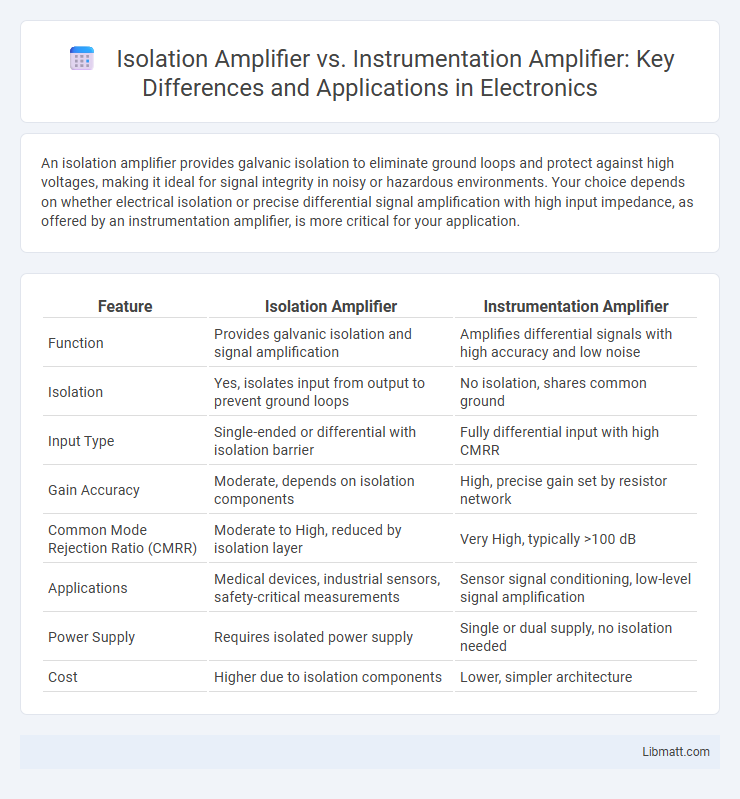An isolation amplifier provides galvanic isolation to eliminate ground loops and protect against high voltages, making it ideal for signal integrity in noisy or hazardous environments. Your choice depends on whether electrical isolation or precise differential signal amplification with high input impedance, as offered by an instrumentation amplifier, is more critical for your application.
Table of Comparison
| Feature | Isolation Amplifier | Instrumentation Amplifier |
|---|---|---|
| Function | Provides galvanic isolation and signal amplification | Amplifies differential signals with high accuracy and low noise |
| Isolation | Yes, isolates input from output to prevent ground loops | No isolation, shares common ground |
| Input Type | Single-ended or differential with isolation barrier | Fully differential input with high CMRR |
| Gain Accuracy | Moderate, depends on isolation components | High, precise gain set by resistor network |
| Common Mode Rejection Ratio (CMRR) | Moderate to High, reduced by isolation layer | Very High, typically >100 dB |
| Applications | Medical devices, industrial sensors, safety-critical measurements | Sensor signal conditioning, low-level signal amplification |
| Power Supply | Requires isolated power supply | Single or dual supply, no isolation needed |
| Cost | Higher due to isolation components | Lower, simpler architecture |
Introduction to Isolation and Instrumentation Amplifiers
Isolation amplifiers provide galvanic isolation between input and output, protecting your system from high voltage transients and ground loops while preserving signal integrity. Instrumentation amplifiers are designed for accurate, low-noise differential signal amplification with high input impedance and excellent common-mode rejection, ideal for precise sensor measurements. Both amplifier types are crucial in applications requiring signal conditioning, but isolation amplifiers focus on electrical isolation, whereas instrumentation amplifiers emphasize measurement accuracy.
Key Differences Between Isolation and Instrumentation Amplifiers
Isolation amplifiers provide galvanic isolation to protect your measurement system from high voltages and noise, ensuring signal integrity in harsh environments. Instrumentation amplifiers excel in high-precision signal amplification with excellent common-mode rejection ratio (CMRR) for accurate, low-level signal measurement. While isolation amplifiers isolate and safeguard signals, instrumentation amplifiers focus on amplifying differential signals with minimal noise and drift.
Basic Operating Principles
Isolation amplifiers use galvanic isolation through transformers or optocouplers to separate input and output signals, preventing ground loop interference and enhancing safety in high-voltage measurements. Instrumentation amplifiers employ three op-amps configured to provide high input impedance, low output impedance, and precise differential signal amplification with excellent common-mode rejection ratio (CMRR). While isolation amplifiers isolate signal paths for noise reduction and protection, instrumentation amplifiers focus on accurate differential amplification of low-level signals in noisy environments.
Common Applications
Instrumentation amplifiers are commonly used in medical devices, sensor signal conditioning, and data acquisition systems due to their high precision and ability to amplify low-level differential signals in noisy environments. Isolation amplifiers find frequent applications in industrial automation, power electronics, and biomedical equipment where galvanic isolation is essential to protect systems from high volttage spikes and ground loops. Your choice depends on whether precise signal amplification or electrical isolation is the priority in your application.
Circuit Design and Configuration
Isolation amplifiers use galvanic isolation components, such as transformers or optocouplers, to separate input and output circuits, preventing ground loops and enhancing noise immunity. Instrumentation amplifiers feature a precise three-op-amp configuration that offers high input impedance, low offset voltage, and excellent common-mode rejection ratio (CMRR) for accurate differential signal amplification. Understanding these circuit design differences helps you select the right amplifier for applications requiring electrical isolation or precision signal conditioning.
Signal Accuracy and Noise Performance
Isolation amplifiers provide superior signal accuracy by preventing ground loops and reducing common-mode noise, essential in high-voltage or industrial environments requiring robust signal integrity. Instrumentation amplifiers excel in noise performance through high input impedance and precise gain settings, making them ideal for low-level signal amplification in medical and sensor applications. Choosing the right amplifier depends on your need for electrical isolation versus fine gain control and low noise in sensitive measurements.
Isolation Features and Safety Benefits
Isolation amplifiers provide galvanic isolation between input and output, effectively protecting sensitive equipment and personnel from high-voltage transients and ground loops. Instrumentation amplifiers lack inherent isolation features but excel in precise low-level signal amplification with high common-mode rejection. The isolation capabilities of isolation amplifiers enhance safety in medical, industrial, and measurement applications where voltage spikes and noise can pose significant risks.
Cost and Integration Considerations
Isolation amplifiers typically incur higher costs due to their internal galvanic isolation components and complex design, making them less economical for large-scale integration. Instrumentation amplifiers offer lower cost and simpler integration as they primarily focus on precise differential signal amplification without isolation features. Choosing between the two depends on the necessity of isolation versus budget constraints and integration complexity in the application.
Selection Criteria for Specific Use Cases
Isolation amplifiers are ideal for applications requiring electrical isolation to prevent ground loops, protect equipment, and ensure safety in high-voltage environments. Instrumentation amplifiers offer high precision, low noise, and excellent common-mode rejection, making them suitable for low-level signal amplification in sensor and measurement systems. Your choice depends on whether electrical isolation or signal accuracy in noisy environments is the primary concern.
Conclusion: Choosing the Right Amplifier
Choosing the right amplifier depends on your application's specific needs for signal integrity and safety; Isolation Amplifiers provide galvanic isolation to protect against high voltage and noise, making them ideal for hazardous or noisy environments. Instrumentation Amplifiers offer high input impedance, precise gain, and excellent common-mode rejection, suitable for accurate low-level signal measurements in controlled settings. Your decision hinges on whether electrical isolation or precise differential amplification is paramount for your measurement system.
Isolation Amplifier vs Instrumentation Amplifier Infographic

 libmatt.com
libmatt.com